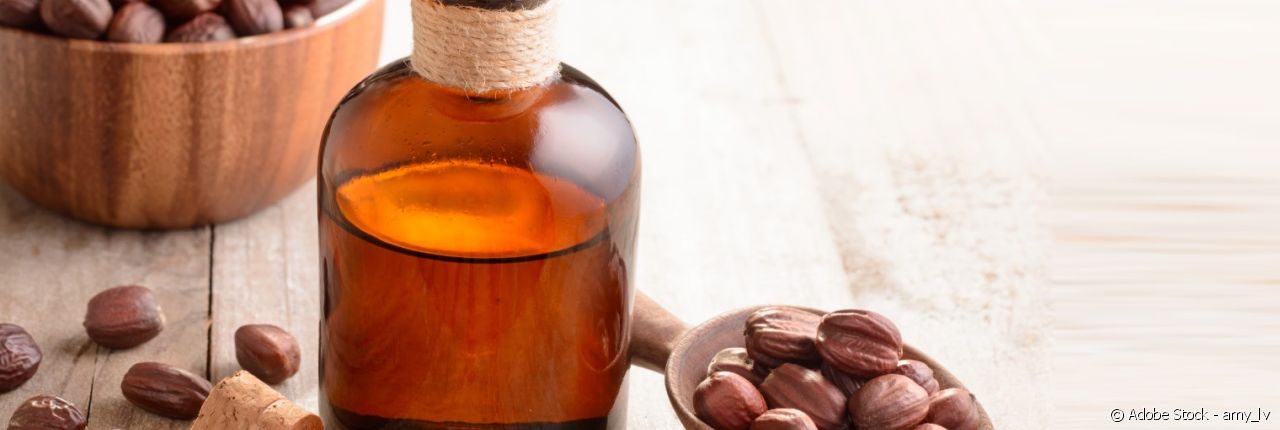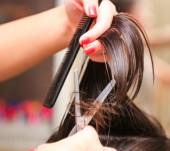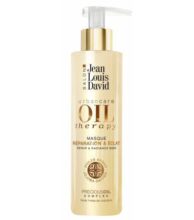
Views on jojoba oil from aromatologist Catherine Gilette
Catherine Gilette is an aromatologist, olfactotherapist and beauty therapy trainer. She is also a big fan of jojoba oil. So it’s with great passion that this expert in plant oils reveals all of her secrets about this oil, which she considers to be “a real gem”.
What sparked your passion for plant oils?
Catherine Gilette: I have extremely reactive skin. For ages I looked for natural solutions so I no longer had to suffer. In 2006, I decided to study natural beauty therapy at the École Lyonnaise de Plantes Médicinales (ELPM) which trains a great many doctors, pharmacists, biologists and chemists in the use of plant-based treatments. Then I worked for 10 years for an environmental protection association where I trained people in how to make natural products that do not generate pollution. Subsequently, out of a desire to diversify my skills, I became an aromatologist and an olfactotherapist.
What are the properties of jojoba oil?
C.G. Before talking about its properties, I’d like to put an end to preconceived ideas about jojoba oil. The first: we refer to the substance as jojoba oil as it is very runny, but from a biochemical point of view it’s a liquid wax. It is made up of 97% wax esters and below 10°C it turns solid. The second: we often praise jojoba oil for its super hydrating powers. Yet, oils, waxes and fats do not hydrate at all. For hydration you need water, and there is none in oils and waxes. Nevertheless, jojoba oil does have super-nourishing powers. It nourishes the skin and hair and prevents dehydration, as it keeps water in their fibres.
Now that we’ve set the record straight, back to the benefits of jojoba wax…
The composition of jojoba wax is pretty unique. It is one of the only plant oils to have such a high gadoleic acid content, a fatty acid from the omega 9 family. This component gives the wax a high penetrating power. Proof being that it does not leave a greasy residue on the skin or hair. Although jojoba oil penetrates so well, it still has an excellent affinity with sebum. It plays a regulatory role in terms of both sebum production and the skin’s pH. Whether you have oily, combination or dry skin, it adapts so that your sebum production is restored to a normal level and so that your body has the optimum acidity of pH 5.
Besides gadoleic acid, jojoba wax contains sterols, biochemical molecules which are similar to cholesterol but lipophilic. They penetrate the skin’s external barrier to work on connective tissue. As a result, they kick-start collagen production which gives the skin its elasticity back. Finally, studies have shown that jojoba wax has both anti-inflammatory and reparative properties. Jojoba wax is a real gem.
What does it do for your hair?
If you have dry hair you can use it as a hair mask applied to the tips, as jojoba wax helps the hair fibre to retain water. Do you have greasy locks and a tendency to suffer from dandruff? This time, apply the self-same mask but to the roots. Leave it to soak in for an hour, even overnight if you can (you simply need to wash it out the next morning), as it will regulate excessive secretion by the sebaceous glands.
Jojoba wax is also beneficial for dull and tired hair as it helps to close the cuticles and coat the hair fibre. As hair is very reactive to its environment, it is subject to the full force of external damaging factors in urban environments, such as pollution. To detoxify your hair, you can mix jojoba wax with green clay and put it all over your hair. Leave the paste to soak in for one to two hours. The clay will then absorb pollution particles. The problem? Green clay also acts as a sponge on water, which can have a drying effect on your hair. This is why it is beneficial to combine it with jojoba oil which can help retain your hair’s water content, thus keeping your hair relatively hydrated.
Jojoba oil is also beneficial on holiday or if you live at the seaside. You can apply it to protect your hair from the sun or dips in the sea, as it has an SPF rating of 5. This is not particularly high, but it is still an asset.
Finally, jojoba wax protects hair from hard water, which tends to weigh your hair down, make it dull and porous. It can also help protect against overly chlorinated water which can cause dandruff.
Does it suit all hair types?
It is an oil that adapts to suit all hair types.
And what about men?
Jojoba oil can help to combat hair loss. It is traditionally used for this purpose, so men are well advised to try it out!

 France
France
 Spain
Spain
 Italy
Italy
 Polska
Polska
 Portugal
Portugal
 Mexico
Mexico
![[EN] Jean Louis David [EN] Jean Louis David](https://www.jeanlouisdavid.us/app/themes/jld/dist/images/svg/logo-jean-louis-david.svg)









